May 16, 2025 | 10:15 GMT +7
May 16, 2025 | 10:15 GMT +7
Hotline: 0913.378.918
May 16, 2025 | 10:15 GMT +7
Hotline: 0913.378.918
With the goal of developing sustainable production and business, Nafoods Tay Nguyen Joint Stock Company under the Nafoods Group has been persistently implementing many practical solutions to build a green and sustainable agricultural value chain, thereby providing safe agricultural products to consumers.
Nafoods Tay Nguyen Joint Stock Company is located in village 5 (An Phu commune, Pleiku city, Gia Lai province). The company has been in operation since 2015, with the initial business of researching and producing passion fruit seedlings and linking with people to grow clean passion fruit for export. As of now, the company has linked with 28 cooperatives in Gia Lai province with 1,783 households to develop the raw material area to more than 2,515 hectares.
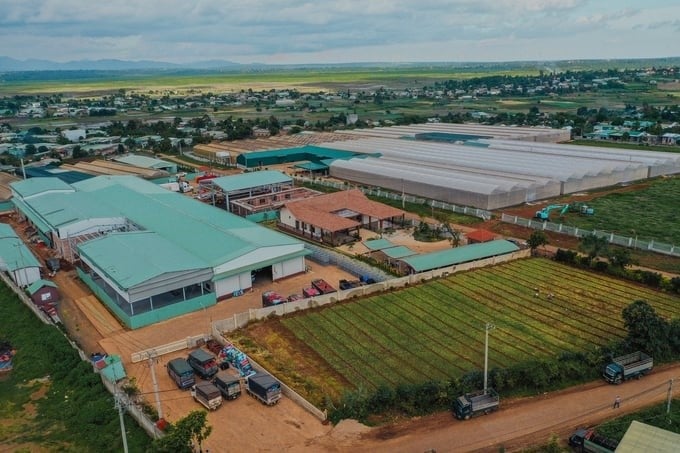
Photo from above of the Nafoods Tay Nguyen High-Tech Park Production Complex. Photo: Thu Hai.
Mr. Ho Hai Quan, Director of the company, said that in implementing Nafoods Group’s sustainable development strategy in developing a digital, green, and sustainable agricultural value chain, focusing on production associated with environmental protection, the company has focused on sustainable development based on five factors, including responsibility for products, responsibility for employees, the environment, community support, and local economic development.
For employees, the company has been perfecting and developing a corporate culture with its own identity, creating a solid and civilized foundation, and ensuring all the rights of employees in the company. The enterprise will make efforts to participate more and more deeply in community support programs and strive to build the locality in the factory area to be increasingly prosperous and civilized.
For local economic development, in all of its activities, Nafoods always aims to connect the company's development with the general development of both the local and national economies.
For the environment, Nafoods is always aware that any farming and business activities can have impacts on the environment. Therefore, the company always strives to find solutions to minimize negative impacts.
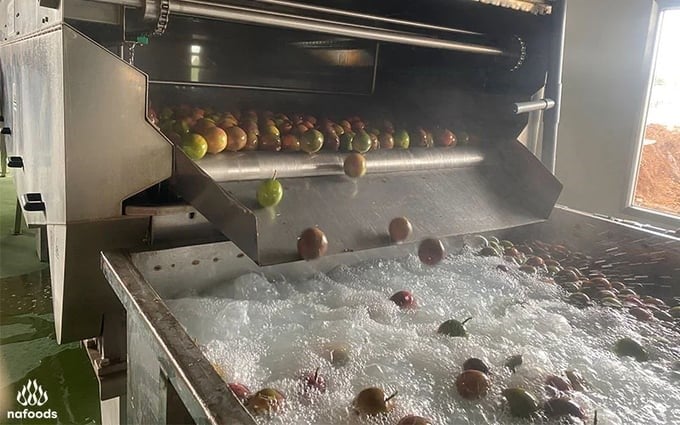
A closed production process is operated at Nafoods Tay Nguyen. Photo: Thu Hai.
Particularly regarding responsibility for products, the company always ensures food safety as a top priority. Nafoods commits that each of its products is the result of a closed production cycle, meeting one of the most stringent quality requirements. Therefore, the enterprise strictly controls quality, from product input to output, and meets international standards in the production process.
To be more specific, the company researches and produces quality passion fruit varieties. In the process of linking with cooperatives and farmer households in planting and caring for gardens, the unit regularly organizes training classes on growing clean passion fruit for people, focusing on instructions on how to use organic fertilizers and biological pesticides to ensure food safety, safety for workers, and minimize impacts on the environment.
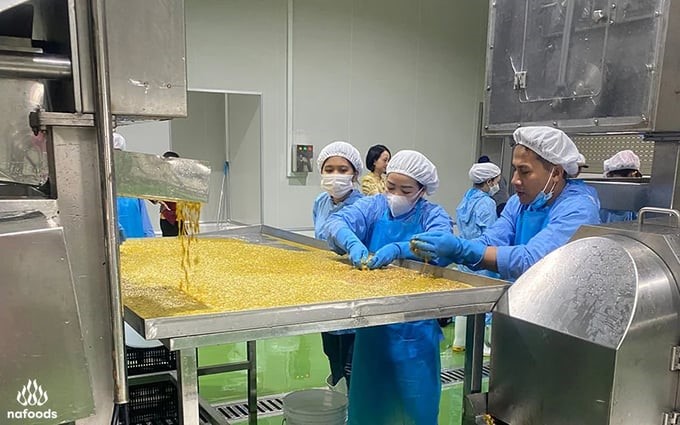
Production line for finished products from passion fruit at Nafoods Tay Nguyen. Photo: Thu Hai.
Mr. Bui Van Toai, Head of the Cooperative Group linking growing areas in La Kenh commune (Pleiku city, Gia Lai province), said: "Every year, the company organizes meetings to disseminate and train people to grow passion fruit in an environmentally friendly direction to create safe and quality products. Specifically, during the process of tillage, seeding, and later care of passion fruit, people comply with regulations on using organic fertilizers and biological pesticides without using chemical fertilizers and pesticides.
"Thanks to implementing this process, passion fruit trees are less susceptible to pests, prolong harvest time, have stable productivity, and meet quality, food safety, and hygiene standards," Mr. Toai affirmed.
Leading us to visit the processing factory area, Mr. Ho Hai Quan, Director of the company, said that, clearly defining its responsibility for environmental protection during the operation process, the company always tries to find solutions to minimize negative impacts on the environment, especially strict waste management and emission treatment.
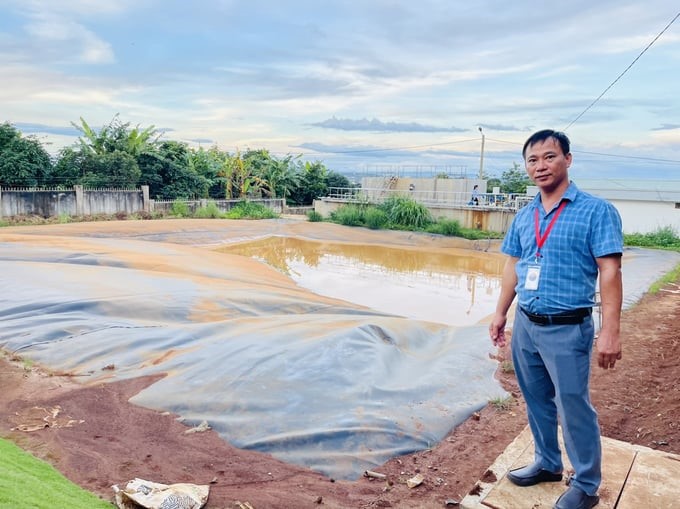
The company's wastewater is treated with biogas tanks to limit odors affecting the environment. Photo: Cuong Nguyen.
“The waste generated during the processing process is mainly wastewater, domestic waste, and hazardous waste (mainly cleaning rags and equipment maintenance lubricants). The company has invested nearly VND 8 billion to build a wastewater treatment system reaching column A with a capacity of 200 m3/day and night, treated according to the technology process of sand separation, treatment with biogas tanks, and anoxic and aerobic gases, biological sedimentation, sterilization, and reuse for gardens.
Quarterly, the company hires functional units to take samples to monitor environmental quality, and the results of wastewater quality monitoring parameters all meet the permitted threshold according to regulations.
In addition, the company also signs contracts with Gia Lai Urban Construction Joint Stock Company to periodically collect domestic waste three times a week and with Hau Sanh Natural Resources and Environment Company Limited (Binh Dinh) to collect and treat hazardous waste.
Currently, the company is also implementing a plan to support the locality in building a residential drainage canal on Pham Van Hai Street, An Phu commune, with a total estimate of VND 2.5 billion," Mr. Quan said.
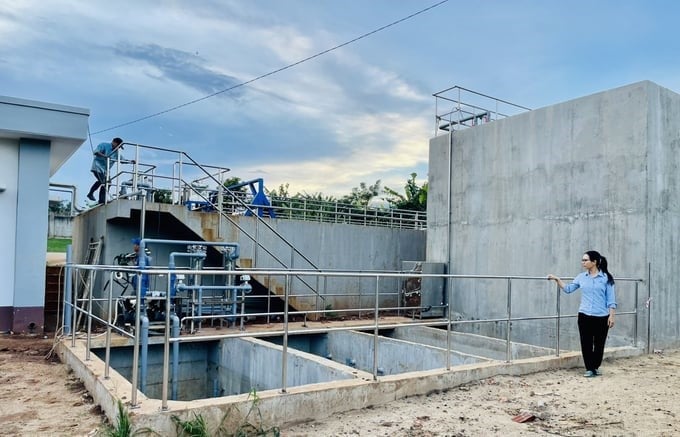
Wastewater treatment system of Nafoods Tay Nguyen Joint Stock Company. Photo: Hung Cuong.
Nafoods Tay Nguyen Joint Stock Company also focuses on building a plan for handling environmental incidents to promptly fix them when they occur.
Notably, in early August 2023, after a leakage incident in the domestic water collection system occurred, leading to an overflow into the drainage ditch of village 5 (An Phu commune) that affected the environment and lives of some households in the village, the company quickly found the cause and implemented remedial measures.
After the incident, the Environmental Police Department (Provincial Police) inspected and made the minutes of work. According to the minutes, Nafoods Tay Nguyen Joint Stock Company had a Decision approving the Environmental Impact Assessment Report of the Provincial People's Committee on March 4, 2019. The company also had the minutes of the appraisal council meeting for issuing an environmental license in June 2023.
The company has built wastewater treatment structures to serve the operational phase, signed a contract for hazardous waste treatment, and has a license to exploit underground water.
At the time of work, the wastewater treatment system was operating normally and was in the process of upgrading its capacity to 500 m3/day and night, with legal documents on food safety.
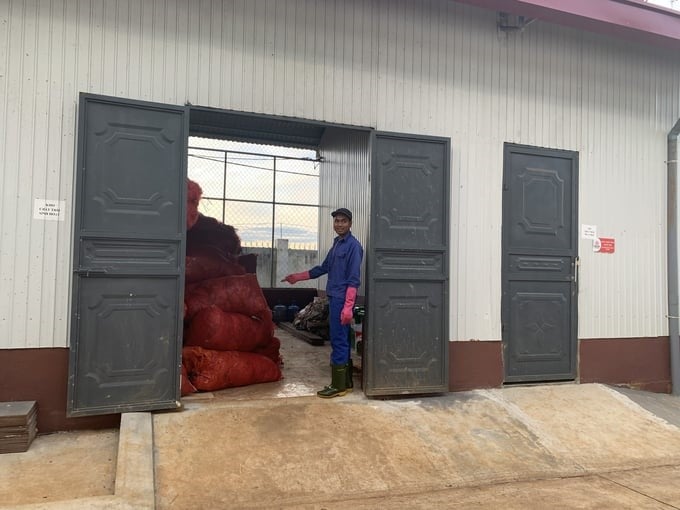
The domestic waste storage house of Nafoods Tay Nguyen Joint Stock Company. Photo: Manh Cuong.
“After the working session, the inspection team requested that the company continue to complete the environmental license application according to the Law on Environmental Protection 2020 and regularly operate the wastewater treatment system to ensure treated wastewater meet technical standards before being discharged into the environment. Continue to comply well with regulations on environmental protection and have plans to handle environmental incidents according to regulations," Director Quan said.
Up to now, the enterprise has temporarily stopped its operation to fix the leaking ditches. At the same time, Nafoods has also built a domestic wastewater collection system and will soon accept it and put it into use. The enterprise will also stop gathering lemon seeds to limit odors that cause environmental impacts and supplement documents to be granted an environmental license according to regulations.
Mr. Pham To, Party Cell Secretary, Village Head of Village 5 (An Phu Commune), said that as of this point, the company has completed the repair of the drainage system leakage incident. The enterprise also commits to good waste treatment to avoid incidents affecting the environment and people's lives, aiming for sustainable development.
Nafoods Group Joint Stock Company was established in 1995 and is a leading enterprise in Vietnam in developing the agricultural value chain from the stages of seeding, growing, processing, and exporting fruit juice products, frozen vegetables, dried fruits, nuts, and fresh fruits.
The enterprise’s vision is to be a pioneering corporation in developing a digital, green, and sustainable agricultural value chain, with a mission to provide the world with natural, safe agricultural products and bring a good life to everyone, especially farmers.
Currently, Nafoods Group is the largest exporter of passion fruit products in Asia, present in more than 70 export markets with flexible market segments.
In 2017 and 2018, Nafoods Group was honored as one of the top 100 sustainable enterprises in Vietnam.
Translated by Huyen Vu Thu

(VAN) Vietnam’s TH Group officially put its high-tech fresh milk processing plant into operation in the Russian Federation, marking a historic moment as the first TH true MILK cartons were produced in Russia.

(VAN) Use of high-quality broodstock and biotechnology is regarded as the most effective approach to ensuring sustainable and economically viable shrimp aquaculture ahead of climate change and the emergence of increasingly intricate disease patterns.

(VAN) Carbon farming is a form of agricultural practices that helps absorb more greenhouse gases than it emits, through smart management of soil, crops, and livestock.

(VAN) This is a key content of the Memorandum of Understanding recently signed between the Vietnam Fisheries Society and Kunihiro Inc of Japan.

(VAN) To achieve the goal, local authorities and businesses in Kon Tum province have fully prepared the necessary conditions for the new Ngoc Linh ginseng planting season.
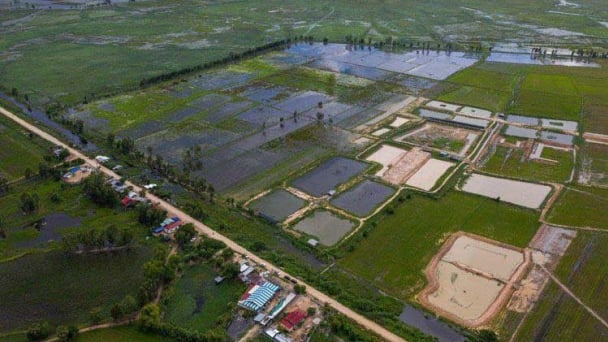
(VAN) Jiangsu province is gearing up to host training programs in Phnom Penh, the capital of Cambodia, this year to establish the Fish and Rice Corridor.
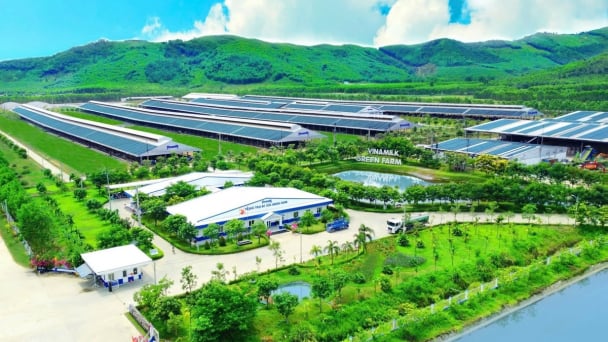
(VAN) Le Hoang Minh, representing Vinamilk, shared the company's experience in energy saving and green energy transition for production at a workshop held during the P4G Summit.